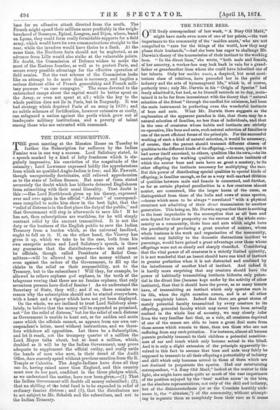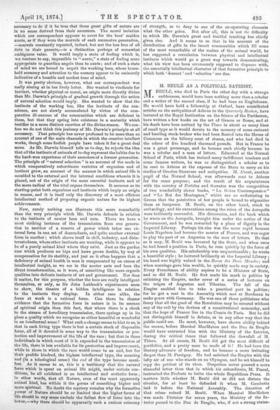THE NEUTER BEES.
nUR lively correspondent of last week, "A Busy Old Maid," might have made even more of one of her points, —the vast importance to the community of the maiden aunts,' who are not compelled to "care for the things of the world, how they may please their husbands,"—had she been leas eager to challenge Mr. Darwin's theory of the transmission of their instinct to the working bees. "In the direct lines," she wrote, "both male and female, of her ancestry, a worker-bee may look back in vain for a grand- father or grandmother from whom she could have inherited one of her talents. Only her maiden aunts, a despised, but most meri- torious class of relatives, have preceded her in the paths of industry and the arts of hymenopteral life," which is, of course, perfectly true ; only Mr. Darwin in his "Origin of Species" had freely admitted it, but had, as he himself reminds us to.day, tamed it to be far from inconsistent with the theory that "natural selection of the fittest" through the conflict for existence, had been the main instrument in perfecting even the wonderful instincts of bees and ants. What Mr. Darwin there suggests as the explanation of the apparent paradox is this, that there may be a natural selection of families, no less than of individuals, and that in the case of creatures whose habits and instincts are strictly co-operative, like bees and ants, such natural selection of fainilies is one of the most efficient forms of the principle. For the successful working of such a kind of natural selection, it would be necessary, of course, that the parent should transmit different classes of qualities to the different kinds of its offspring,—to some, qualities it had never itself exercised, to others, qualities like its own,—to its neuter offspring the working qualities and elaborate instincts of which the neuter bees and ants have so great a mastery, to its other offspring the instincts necessary for multiplying the race. But this power of distributing special qualities to special kinds of offspring, is familiar enough, so far as a very well-marked division of qualities between male and female is concerned, and farther, so far as certain physical peculiarities in a few creatures almost neuter, are concerned, like the larger horns of the oxen, as distinguished from those of the bulls and cows of some species, —horns which seem to be always " correlated " with a physical structure not admitting of their direct transmission to another generation. This being so, Mr. Darwin argues that there is nothing in the least improbable in the assumption that as all bees and ants depend for their prosperity on the success of the whole com- munity as a community, thol3e bees and ants which might have the peculiarity of producing a great number of neuters, whose whole business is the work and organisation of the community, without any liability to the domestic distractions incident to parentage, would have gained a great advantage over those whose offsprings were not so clearly and sharply classified. Considering that the vital power of all creatures is a 'Aridly limited quantity, it is not wonderful that an insect should have one kind of instinct in greater perfection when it is not distracted and confused by the interference of another kind of instinct. And indeed it is hardly more surprising that any creature should have the power of habitually transmitting instincts hitherto only poten- tial in the direct line (because kept under by the activity of other instincts), than that it should have the power, as so many insects have, of transmitting an instinct which only operates once in its life, when the right occasion comes, and is at all other times completely latent. Indeed that there are great stores of merely potential faculty transmitted by every creature to its offspring, potential faculty which may never have been actually realised in the whole line of ancestry, we may clearly infer from the very familiar fact that, as a rule, all creatures deprived of one of the senses are able to learn a great deal more from those senses which remain to them, than can those who are not suffering from any such privation. For instance, almost all human parents probably transmit to their children a potential sensitive- nese of ear and touch which only become actual in the blind. And it is only a• slight extension of the principle apparently in- volved in this fact to assume that bees and ants may fairly be supposed to transmit to all their offspring a potentiality of industry and skill which only becomes actual in those of them which are not destined to perpetuate the species. Had our entertaining correspondent, "A Busy Old Maid," looked at the matter in this light, she might have made quite as much of the vast importance of the position enjoyed by the bees' maiden aunts' in the hive, as the absolute representatives, not only of the skill and industry, but of the disinterestedness (or as the Comdata horribly nick- name it, the "altruism,") of the community, without attempt- ing to separate them so completely from their race as it seems
necessary to do if it be true that these great gifts of nature are in no sense derived from their ancestors. The moral isolation which our correspondent appears to covet for the bees' maiden aunts, as if they were the marvels of each successive generation, —marvels constantly repeated, indeed, but not the less free of all debt to their parents,—is a distinction perhaps of somewhat ambiguous value. It would imply a state of feeling which is, we venture to say, impossible to "aunts," a state of feeling more appropriate to guardian angels than to aunts ; and of such a state of mind we are bound to acquit the working bees, whose house- hold economy and attention to the nursery appear to be eminently indicative of a humble and modest tone of mind.
It was pretty obvious, however, what our correspondent was really aiming at in her lively letter. She wanted to vindicate for instinct, whether physical or moral, an origin more directly divine than Mr. Darwin's principle of gradual growth through the action of natural selection would imply. She wanted to show that the instincts of the working bee, like the instincts of the con-
science, are not slowly accumulated by virtue of the com- parative ill-success of the communities which are deficient in them, but that they spring into existence in a maturity which testifies to a more distinct exertion of the divine reason. We con- fess we do not think this jealousy of Mr. Darwin's principle at all necessary. That principle has never professed to be more than an account of one of the main channels in which the creative intellect works, though some foolish people have taken it for a great deal more. As Mr. Darwin himself tells us to-day, he rejects the idea that all the instincts of animals of to-day represent the habits due to the hard-won experience of their ancestors of a former generation. The principle of "natural selection" is an account of the mode in which comparatively subordinate varieties of organism and of instinct grow, an account of the manner in which animal life is moulded to the external and the internal conditions wherein it is placed, not of the origin of the more essential instincts and of the more radical of the vital organs themselves. It assumes as its starting-point both organisms and instincts which imply an origin in reason, and it is itself only the discovery of a most efficient intellectual method of preparing organic nature for its highest achievements.
Now, surely nothing can illustrate this more remarkably than the very principle which Mr. Darwin defends in relation to the instincts of neuter bees and ants. There we have a most striking instance of the transmission from one genera- tion to another of a reserve of power which takes one ex- ternal form ia one set of descendants, and quite another external form in another ; which shows itself in skill, industry, and disin- terestedness, where other instincts are wanting, while it appears to be of a purely animal kind where they exist. Just as the garden rose which produces no hips and haws grows double, by way of compensation for its sterility, and just as it often happens that a deficiency of animal health in man is compensated by an excess of intellectual insight, so we see in the neuter ants and bees the direct transformation, as it were, of something like mere organic qualities into delicate instincts of art and government. Nor does it matter, for this purpose, whether the bees are really intelligent themselves, or only, as Sir John Lubbock's experiments seem to show, the theatre of a hidden intelligence in relation
to the instincts they display. In either case alike, the force at work is a rational force. Can there be clearer evidence that the formative force in nature is in its essence of spiritual origin than this fact, that where there is a check to the stream of hereditary transmission, there springs up in its place a quality which we recognise as either beautiful or wonderful in an intellectual sense? What such a change seems to hint to us, is that in each living type there is but a certain stock of disposable force, all of it devoted in some way to the transmission or pro- tection and improvement of the life of the race ; but that in those individuals in which most of it is expended in the transmission of the life, there is less available for its protection and improvement, while in those in which the race would come to an end, but for their prolific kindred, the highest intellectual type, the meaning and (in a teleological sense) the end of the type become mani- fest. As it seems to us, this is a testimony that the natural force which is spent on animal life might, under certain con- ditions, be all exhibited in an intellectual and msthetic form ; in other words, that all Nature, even of the most apparently animal kind, has within it the germs of something higher and more spiritual. No doubt the mystery remains why the formative power of Nature should be so limited that the higher forma of life should in any sense exclude the fullest flow of force into the lower,—why there should be apparently such a curious economy of strength, as to deny to one of the co-operating elements what the other gains. But after all, this is•not the difficulty to. which Mr. Darwin's great and fruitful teaching has chiefly given rise. And it seems to us that in his account of the distribution of gifts in the insect communities which fill some of the most remarkable of the realms of the animal world, he has suggested a correlation between physical and intellectual instincts which would go a great way towards demonstrating, what his view has been erroneously supposed to dispense with, the essentially intellectual character of that formative principle to which both 'descent ' and ' selection ' are due.



































 Previous page
Previous page